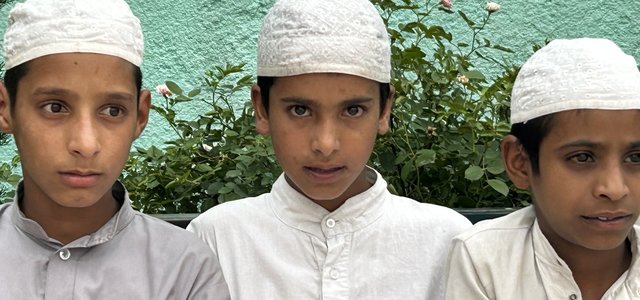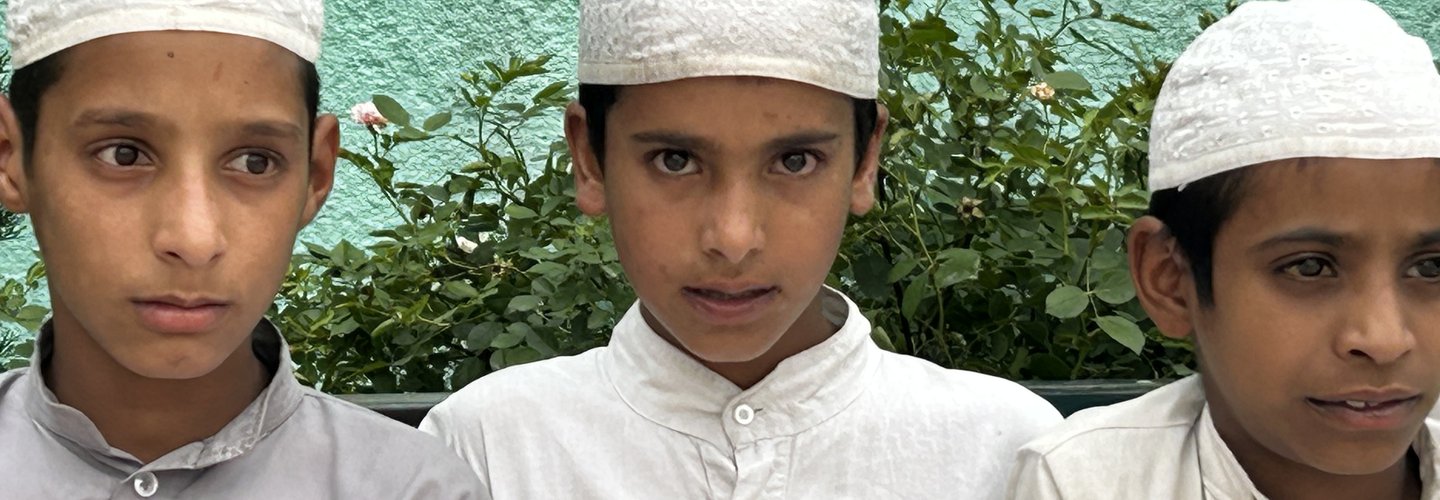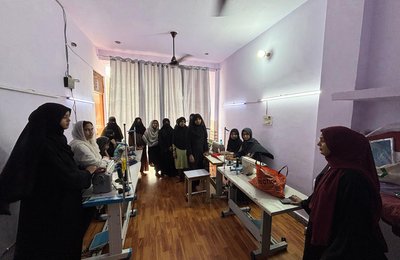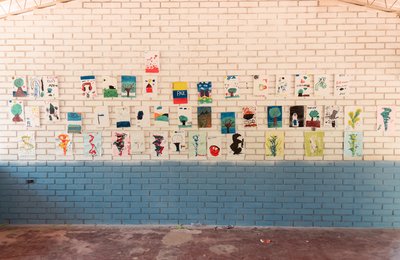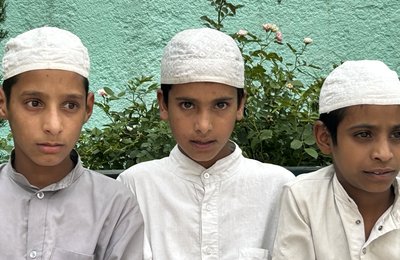Poonch: The battlefield of Jammu and Kashmir, yet also a peace front
Almost three months after Operation Sindoor and the subsequent ceasefire between India and Pakistan, locals and social media reported that on 5 August there was firing from across the border, an allegation the army denied, stating there were no ceasefire violations. The incident once again stirred anxiety among the people, as tensions between the two countries continue to remain high. As such, the emotional and psychological trauma of the people has become a persistent reality. More so with the new war doctrine that any act of terrorism will be seen as an act of war. Here is an account of my visit to Poonch, the theatre of ‘war’, in May, soon after the ceasefire announcement.

Introduction
Stone-faced, Ursha sat beside her husband, Rameez Ahmed, who was recovering from multiple surgeries. He had been struck by shell splinters and was still unaware that their two children had died. It was a difficult conversation for Ursha (Adiya) Khan, the mother of twins Zain and Zoya. They had lost their lives on 7 May when their home, located in Poonch, just 10 km from the Line of Control in Jammu and Kashmir, was hit by a mortar shell fired from across the border, which targeted civilian areas.
As I entered the hospital room at the Government Medical College in Jammu, I hesitated. What could I possibly say to a mother who had just lost her children and was tending to her unconscious husband? Ursha, shielding Rameez from further anguish, had suppressed her own grief, pretended their children were safe. She kept the truth from him for days. When Rameez was finally told, he was inconsolable. And so was Ursha, who at last allowed herself to mourn.

Ursha Khan, the mother of twins Zoya and Zain, sits quietly beside her husband, Rameez Khan, in a hospital ward in Jammu. Just days earlier, a mortar shell tore through their rented accommodation in Poonch city as they were trying to flee to safety. The shrapnel killed both children instantly. Rameez was seriously injured and remains unaware of the unbearable truth.
Ursha, herself wounded by grief, carries the weight of that truth in silence. She tends to her unconscious husband, shielding him from the devastating loss, knowing that his recovery depends on not knowing, not yet. Her eyes speak of the pain she cannot utter. In her quiet, determined presence, there is a mother’s unfathomable sorrow and a wife’s strength, holding grief in one hand and hope in the other.
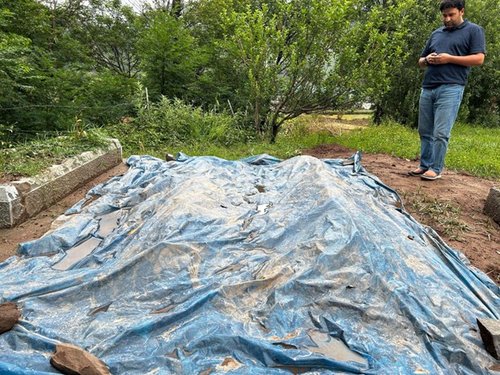
Zoya and Zain, the spirited twin brother and sister, now lie buried in the backyard of their ancestral home in Kalani Chakthru, a quiet village in Chandank, Poonch. Their family had moved to a rented house in the city, close to Christ School, where the children studied, hoping to give them a better education and brighter future. Two vibrant, joyful lives, full of laughter and curiosity, were silenced in an instant by a mortar shell, victims of a war they could neither understand nor escape. Their dreams, their parents’ hopes, and the simple rhythm of family life were shattered in a single moment. Now, their school bags hang untouched, toys lie scattered, and the silence in their home is deafening. The war didn’t just take two children, it snapped a family’s thread of joy, rewriting their future with grief and memory.
Twenty days after the shelling, I travelled from Jammu to Poonch to meet other survivors and document their stories. What unfolded before me was not just a landscape of devastation and grief but also a deeply layered history of memory, resilience, and the quiet weaving together of communal bonds that have withstood the pressures of conflict and division. But people in Poonch were shocked; not in living memory had their city been bombarded like this. “We have lost everything, [including] our present and future,” said Sanjeev Kumar, the father of 14-year-old Vihaan, who was hit by a shell and died when the family was trying to escape to Jammu. Sanjeev’s nephew and brother-in-law had been seriously injured too and were being treated in Amritsar, a city in the neighbouring state of Punjab. I tried to console him and his stunned wife Rashmi Sudan. She too, had been hit by a shell splinter in the head.
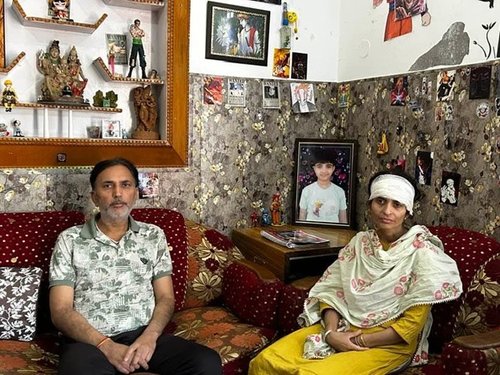
“Vihaan was a very talented boy. This is his room. I had told him to decorate it as he wished. He used to paint so well. For us our world has finished. Nothing matters now,” said Sanjeev Kumar, Vihaan’s father, as he flicked through Vihaan’s drawing books, unable to believe that he had lost his only son to the war that shook Poonch.
The couple, with their son Vihaan, lived in a refugee colony. “People who had fled in 1947 from Pakistan are settled here,” informed Saddaqat Mir, a social activist who has a shop close to Vihaan’s home. Showing Vihaan’s photo saved in his mobile phone, he lovingly recalled how Vihaan used to come and buy sweets from his shop, and they used to play cricket together. “Pakistan has destroyed our city. They have also tried to create a wedge between communities, thinking that Muslims will support them. But we are together with our Hindu and Sikh brothers in our fight against terrorism,” he said angrily. For the next couple of days, Saddaqat became my guide, helping me meet other victims. He took me to a vantage point up a hill that overlooked the city. “It is from here that shells came into the city,” he showed me with a circling sweep of his hand.
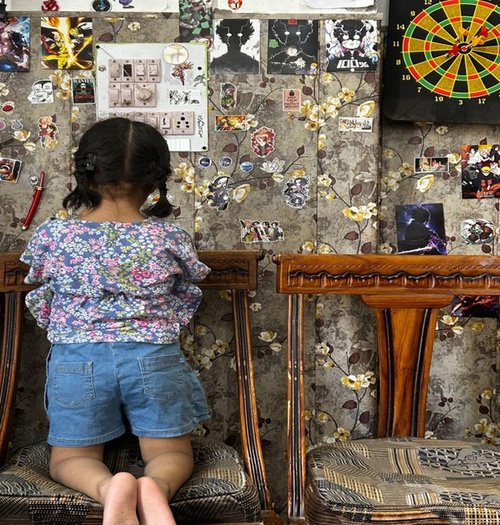
Vihaan’s five-year-old cousin gazes silently at the walls he once decorated. Unable to fully grasp what has happened, she remains too frightened to speak about that day. Yet, she keeps asking her mother, “Who will I tie my Rakhi to now?”, referring to the sacred thread tied during the Indian festival of Raksha Bandhan that celebrates the bond between brothers and sisters.
Poonch represents a unique dimension of the Kashmir conflict. Its geographical location, right along the volatile Line of Control, has made it a default flashpoint, bearing the brunt of every military escalation or diplomatic fallout between India and Pakistan. And yet, despite generations of hardship, displacement, and cross-border shelling, the people of Poonch have never abandoned their core values of resilience, harmony, and coexistence. They respectfully retain their collective identity, rooted in shared survival and mutual respect. The recent ‘war’ between India and Pakistan over the terror attack in Pahalgam on 22 April 2025 once again smothered the border district, but not the spirit of its people. The photo essay captures the moments of truth, heartbreak, resilience, uncertainty, and reckoning in the lives and matters of Poonchis, an identity that the people carry with pride.
How it all began
On 6 May 2025, between 1:05 and 1:30 a.m. IST, India, in an ‘act of justice’ for the victims of the Pahalgam carnage on 22 April in Kashmir, launched Operation Sindoor. It carried out a series of precision airstrikes targeting nine ‘terrorist’ camps located within Pakistan and Pakistan-occupied Kashmir. The strikes came 14 days after the Pahalgam terror attack, which left 27 civilians dead. The terror attack had shocked the country and many around the world.
In a retaliatory move on 7 May, Pakistan deployed drones across several northern Indian cities, many of which were intercepted. In response, India neutralised enemy air defence radars in Pakistani territory, marking a further intensification of hostilities. By 9 May, the conflict had widened: India conducted targeted drone operations on four military installations within Pakistan, while cross-border artillery exchanges along the Line of Control continued, causing casualties on both sides.
On 10 May, the confrontation reached a critical point. Pakistan launched unmanned combat aerial vehicles, loitering munitions, and manned aircraft against both civilian and military targets on India’s western front. Simultaneously, it escalated heavy shelling across the Line of Control, particularly impacting border towns such as Tangdhar and Uri in Kashmir Province, and Poonch and Rajouri in Jammu Province.
Among the worst hit was the historic town of Poonch, a border town on the Line of Control between Pakistan and India, nestled in the southwestern flank of the Pir Panjal range, approximately 230 kms from Jammu city. The residents of Poonch claim that more than 500-600 shells fell in their town, including schools, hospitals, gurdwaras, temples and madrasas, sparing none in their volley. The shelling continued for three days. When I went to Poonch 20 days later, its aftermath could be seen in the pock-marked buildings, shattered windowpanes, burnt cars and scooters, and in the grief stricken hearts of those who lost their loved ones. Many were recovering from their injuries in the hospital. Local residents said that it was the first time that the city had witnessed a barrage of shells since the partition.
Return to history, layered memory and identity
For the people of Poonch, the shelling wasn’t just cross-border aggression, it was a return to history. A return to the Kabali invasion of 1947 by Pakistan, the partition and fall of Poonch, the Indo-Pak wars of 1965 and 1971, the militancy of the 1990s and 2000s, and the long, tense years of cross-border firing before the ceasefire of 2005. These are not textbook events here. They are lived, inherited realities.
While staying with a local family, the Sharmas, an evening conversation in their dining area led me to ask Mrs. Sharma why they hadn’t left Poonch during the recent shelling, even when both of her sons, away in Jammu, were begging her to go. She answered quietly, “When the Kashmiri Pandits left their homes in 1990 in Kashmir, they still haven’t been able to return. We feared we might not be able to come back either.”
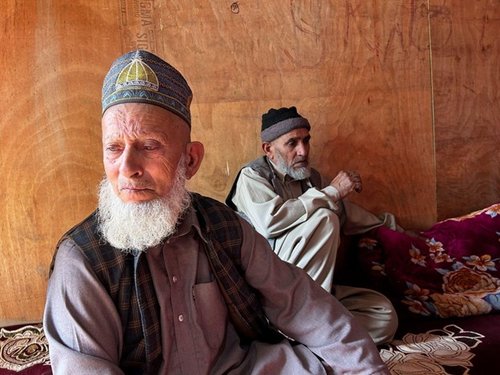
The mortar shells did not discriminate by religion or social status. “We lost our breadwinner,” says Moh’d Sharief, Abrar’s father (seated on the right). Moh’d Abrar leaves behind three children, his parents, brother, and his uncle’s family. “He was a rare soul - always looking after everyone. This cruel war snatched him from us,” says Qamaruddin, his uncle (seated on the left).
Her words carried the weight of another community’s displacement, and the deeply internalised fear of becoming refugees in their own country. In Poonch, the identity of a refugee is not just a label, it is a shared wound. It reaches back to the division of 1947, when families fled from what is now Pakistan-occupied Jammu and Kashmir, never to return.
For many in Poonch, staying amid violence is not only about courage. It is about memory, belonging, and the fear of losing oneself again. Just as Kashmiri Pandits were displaced from the Valley in the 1990s, in a haunting reversal, Muslim families who once fled militancy to urban safety are now retreating back to abandoned hill villages. Violence does not discriminate in its displacement. Moh’d Abrar, a father of three children and a driver by occupation, was killed outside his home in the hills of Loran when a shell hit him. When I spoke to his father, Moh’d Sharief, he told me, “We suffered during militancy too. Now, again, we are paying the price for someone else’s war.” Abrar’s children Wahid, Rahid, and Misba sat in stunned silence, unable to process their loss. His uncle was sitting next to them, sobbing, and said, “We were all trying to escape to the upper reaches when the shell struck him.” Like many families, painfully - and ironically - having built new houses in the city, they escaped to their abandoned highland villages, this time to seek safety from the shells pounding the city. “Our family has dislocated several towns since we left our village due to militancy. We finally settled in Poonch city as it offers the best opportunities for education and progress, but it seems we will have to go back to our village home. The future holds uncertainty,” said Saddaqat ruefully.
![“My mother, siblings and I were in our dhok [mud house] in the upper reaches. We were waiting for our father to join us. But he did not survive. Then in the morning we came down to perform the last rites. We miss him,” says a shocked Waheed, Abrar's eldest son, who had just returned from Jamia masjid prayers seeking a place in jannat (heaven) for his father. Sitting next to him, his sister Misba barely spoke a word. “I miss him,” she whispered.](https://peaceinsight.s3.amazonaws.com/media/images/Poonch_No_6.width-500.jpg)
“My mother, siblings and I were in our dhok [mud house] in the upper reaches. We were waiting for our father to join us. But he did not survive. Then in the morning we came down to perform the last rites. We miss him,” says a shocked Waheed, Abrar's eldest son, who had just returned from Jamia masjid prayers seeking a place in jannat (heaven) for his father. Sitting next to him, his sister Misba barely spoke a word. “I miss him,” she whispered.
Their stories tell us that the people of Poonch carry their trauma as testimony, quietly and resiliently. Their resistance is not loud, but rooted in remembrance, which they refuse to part ways with. Remarkably, they always rise from the aftermath of violence and war as a collective. The gurdwaras and temples offered refuge during the shelling. Their unity is not performative but forged in decades of survival across faiths and identities. I caught a glimpse of it while sitting in the courtyard of Surjan Singh, uncle to the late ex-serviceman Amarjeet Singh, who was killed by a shell splinter. They live next to Gurdwara Bhai Mohan Mahant Singh Sahib, which became a collective refuge for all communities. The gurdwara’s walls were damaged and the district hospital next to it barely survived the shell. Surjan Singh took me to the gurdwara and told me that the shell had fallen onto their roof early in the morning, at around 6 am, while he was sleeping, having spent the night helping people in the hospital. His turban had miraculously saved him from the splinter, but unfortunately it hit his nephew who died instantly.
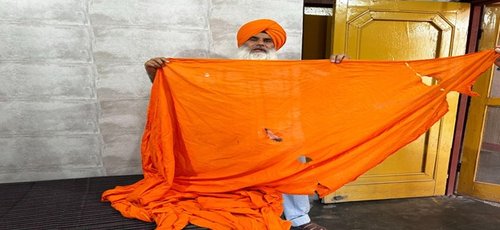
Surjan Singh’s turban saved him as the shell splinter could not pierce its layers to harm him. He says it is the blessings of his Gurus.
The Sikh family sat in solemn silence mourning the loss of Amarjeet Singh. His wife, Harpreet Kaur, her voice trembling with pain, looked at her splinter-damaged home, remembering her husband. Sardar Janak Singh, a close relative and former political activist, recalled the history of Poonch, which brings terrifying memories of fear and the violent environment in Poonch in 1947. “I was ten-years-old and I vividly remember that all our relatives fled from Pakistan. Our houses were burnt and scores of them killed. Poonch became the headquarters of refugees coming from Pakistan. There was chaos all around. It was only when the Indian army arrived [that] stability and peace came. Later when the ceasefire was announced, people felt safe.” These traumatic memories resurfaced during Operation Sindoor.

Harpreet Kaur witnessed the death of her husband, Nayak Amarjeet Singh, who was struck by a mortar shell splinter that also damaged nearby houses and the revered Gurdwara Bhai Mohan Mahant Singh Sahib. “It happened so quickly, he didn’t even have a chance to escape,” she said. While Harpreet has found strength in the support of the Singh community, her extended family, and the government, which has offered her a job, the horror of that day continues to haunt her. Their home now resounds with continuous recitations of Shabad from the sacred Guru Granth Sahib, the holy scripture of the Sikhs, as an act of collective healing and spiritual solace.
Unlike in the rest of the region of Jammu and Kashmir, in Poonch, identities rooted in religion, ethnicity, or region do not function as rigid boundaries. When shells struck the Jamia Zia-ul-Uloom, a sprawling madrasa in the city where 1,200 children were getting ready to offer morning prayers, one struck their teacher, Qari Moh’d Iqbal. Pradeep Sharma, a Hindu and former member of the legislative assembly, rushed to save him. He carried Moh’d Iqbal to the district hospital even when shells were pounding all around. In Poonch, the shared history of partition and conflict intersects with conflict and resilience, fostering a collective identity shaped by survival and mutual dependence.

Two boys studying in the Jamia Zia-ul-Uloom madrasa took me to the spot where the shell had pierced through the roof, and its splinters hit their teacher Qari Moh’d Iqbal as he was waking up in the morning for prayers.
“We fiercely safeguard our collective identity in a protective way, challenging circumstances and current geopolitics that might thwart it,” said Surjan Singh. He took me to a revered gurdwara in the Nangali Sahib region. “It's here that in 1803 Bhai Mela Singh laid the foundation of the Sikhi and brotherhood in the region. He advocated for communal harmony amongst all religious sects. His contributions are still etched in the collective consciousness,” affirmed Surjan Singh.
I noticed the spirit of bhaichara (community bonding) while I walked through the lanes of Poonch and trekked to the hills to reach people’s homes, listening to their stories. Poonch is not just a story of shelling, but of intergenerational strength and bonding, where the past walks alongside the present. People’s lived realities are passed down through families, generation after generation.
“What we are facing now is as brutal as any war in the past,” said K.D. Maini, a noted historian and author from Poonch. Briefing me on the trajectory of invasions on Poonch, he elaborated with pride that even Mohammad Ghazni, who came to conquer Kashmir in 1015, could not defeat the defenders. The warriors used to take this route only to invade Kashmir, but Poonch always had a tough resistance. In 1947 the same happened. A revolt was engineered but the forces could not go beyond Poonch towards Kashmir. Even in the 1965 war under Operation Gibraltar the region of Pir Panjal was targeted. Referring to Pakistan, he added, “They also feel that being a Muslim majority region, Muslims of Poonch will support them, but the Muslims in Poonch have been very secular. They have never supported any overtures by Pakistan. They did not support in ‘47, ‘65, ‘71, or even in militancy they did not play an active role. Even now, no local person has supported them even in this war,” he opined.
Aftermath and future strategy
Poonch is not just a geostrategic frontier, vital to national security, it is also a site of human vulnerability. When military escalations like the recent bombardments unfold, two parallel realities emerge. One is the realm of strategic deterrence, high-tech warfare, and state capability. The other is the lived precarity of civilians, who lack the infrastructure or support to endure such offensives. “We are with the government for its war against terrorism, but we need to be secured. Bunkers and medical facilities need to be available for any future crisis,” said a shaken Simran, the 12-year-old eldest daughter of 32-year-old Balvinder Kaur who was the first victim of the war in Mankot, a Sikh populated village, 42 kms from Poonch. Simran’s father, Kala Singh, sat with his children and kept asking how he and his three children, including 2-year-old Ranbir, would survive. “Agar desh nu aye jung jeetni hai tey dono military aur naitik taur pe jitni payegee. Logon na mehfooz karna payega,” he said in chaste Punjabi (India will have to win this war both militarily and morally too. People need to be safe).

Kala Singh, a daily-wage labourer from Mankot, a Sikh village in Poonch district, was caught in a sudden volley of mortar shells fired from across the border. His wife, Balvinder Kaur, became the first civilian casualty of the war. “We didn’t feel safe in our home,” he said, his voice heavy with exhaustion and disbelief. “The gurdwara was already crowded, so we ran to my uncle’s house. But just as she stood near the window, the shell struck.” His words faltered as he recalled the moment that changed everything. The grief clung to him like dust from the ruins. Looking down at the ground, he asked quietly, “How will I raise the children alone? Especially my youngest, just two years old?” The question hung in the air, as raw and unanswerable as the loss itself.
Conclusion
Conflicts around the world tell us that nation states, while fortifying their external defences, need to invest in human security systems: functional bunkers, accessible healthcare, trauma care, and sustainable rehabilitation. This is not merely a logistical problem, it must be a policy priority.
While the Poonch administration and the central government take on the task of rebuilding Poonch, it is the people of Poonch who have shown remarkable resilience in the face of repeated conflict, not just surviving, but holding on to the bonds of unity and coexistence that define them. Their courage demands not only recognition but also investment in a shared future built on dignity, safety, and peace.
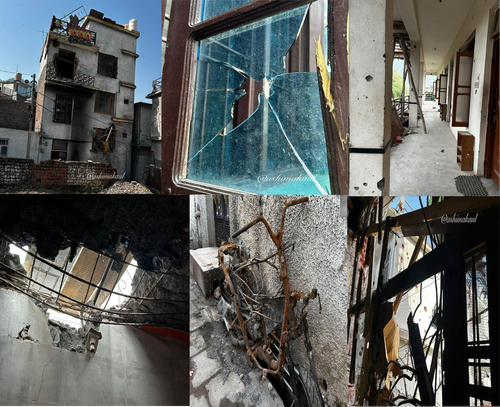
The face of the war in Poonch: images of some of the damage caused to people’s homes by the shelling.
All photos taken courtesy of the author, Ashima Kaul in 2025

